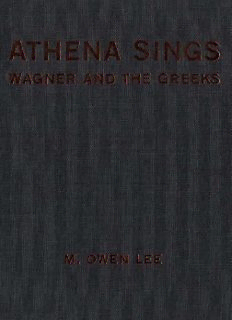
Athena Sings: Wagner and the Greeks PDF
Preview Athena Sings: Wagner and the Greeks
ATHENA SINGS: WAGNER AND THE GREEKS Richard Wagner's knowledge of and passion for Greek drama was so profound that for Friedrich Nietzsche, Wagner was Aeschylus come alive again. Surprisingly little has been written about the pervasive influence of classical Greece on the quintessentially German master. In this elegant and masterfully argued book, renowned opera critic Father Owen Lee describes for the contemporary reader what it might have been like to witness a dramatic performance of Aeschylus in the theatre of Dionysus in Athens in the fifth century B.C. - something that Wagner himself undertook to do on several occasions, imagining a performance of The Oresteia in his mind, reading it aloud to his friends, providing his own commentary, and relating the Greek clas- sic drama to his own romantic view. Father Lee also uses Wagner's writings on Greece and entries from his wife's diaries to cast new light on Tristan und Isolde, Die Meister- singer, Parsifal, and especially the mighty Ring cycle, where Wagner made extensive use of Greek elements to give structural unity and dramatic credibility to his Nordic and Germanic myths. No opera fan, argues Father Lee, can really understand Wagner saving Brimhilde without knowing the Athena who, in Greek drama, first brought jus- tice to Athens. Written with a clarity and depth of knowledge that have character- ized all Father Lee's books on the classics of Greece and Rome and made his six other volumes on opera bestsellers, Athena Sings traces the profound influence - an influence few music lovers are aware of - that Greek theatre and culture had on the most German of composers and his revolutionary musical dramas. FATHER M. OWEN LEE, csB, is a Catholic priest and professor emeritus of Classics at St Michael's College, University of Toronto. He has been a commentator for the Texaco Metropolitan Opera radio broadcasts for many years, and is the author of a number of books on opera, including A Season of Opera: From Orpheus to Ariadne (UTP 1998) and Wagner: The Terrible Man and His Truthful Art (UTP 1999). This page intentionally left blank This page intentionally left blank ATHENA SINGS Wagner and the Greeks M. OWEN LEE UNIVERSITY OF TORONTO PRESS Toronto Buffalo London www.utppublishing.com © University of Toronto Press Incorporated 2003 Toronto Buffalo London Printed in Canada ISBN 0-8020-8795-7 (cloth) ISBN 0-8020-8580-6 (paper) (S) Printed on acid-free paper National Library of Canada Cataloguing in Publication Lee, M. Owen, 1930- Athena sings : Wagner and the Greeks / M. Owen Lee. Includes bibliographical references and index. ISBN 0-8020-8795-7 (bound). ISBN 0-8020-8580-6 (pbk.) 1. Wagner, Richard, 1813-1883 - Criticism and interpretation. 2. Wagner, Richard, 1813-1883 - Knowledge - Greek drama. I. Title ML410.W13L48 2003 782.1'092 C2003-902153-X University of Toronto Press acknowledges the financial assistance to its publishing program of the Canada Council for the Arts and the Ontario Arts Council. University of Toronto Press acknowledges the financial support for its publishing activities of the Government of Canada through the Book Publishing Industry Development Program (BPIDP). for Emmet Robbins This page intentionally left blank This page intentionally left blank CONTENTS Preface ix ONE Athena Sings 3 TWO Intermission 45 THREE Briinnhilde Sings 53 Notes 89 Bibliography 103 Index 107 This page intentionally left blank This page intentionally left blank PREFACE This volume expands a lecture I first gave to the Toronto Wagner Society in 1984 and subsequently to the Alumni of St Michael's College in Toronto and to the Wagner Society of Southern California. Its subject, the influence of ancient Greece on the work of Richard Wagner, is one which, despite its importance, was long neglected in Wagner studies outside of Germany. In 1976 the classicist Hugh Lloyd-Jones could find only a single treatment of the theme in English, a pioneering but 'not wholly ade- quate' 1919 Columbia University dissertation by Pearl C. Wilson. And he searched in vain through the many volumes on Wagner by Ernest Newman for any indica- tion that the most influential English authority on Wag- ner regarded the subject as of any importance at all. Several treatments in English on Wagner and the Greeks have since then made their way into print. This is, I believe, the first that attempts to reach an audience that knows more about Wagner than it does about the Greeks. In my first chapter, I try to convey to the Greek- less reader what it might have been like to witness a per- formance of Aeschylus in Athens in the fifth century BC. It was something Wagner himself undertook to do on several occasions, imagining a performance of the Orest- eia in his mind, or reading its three parts to friends and providing his own commentary. I have chosen, like Wag-
Description: